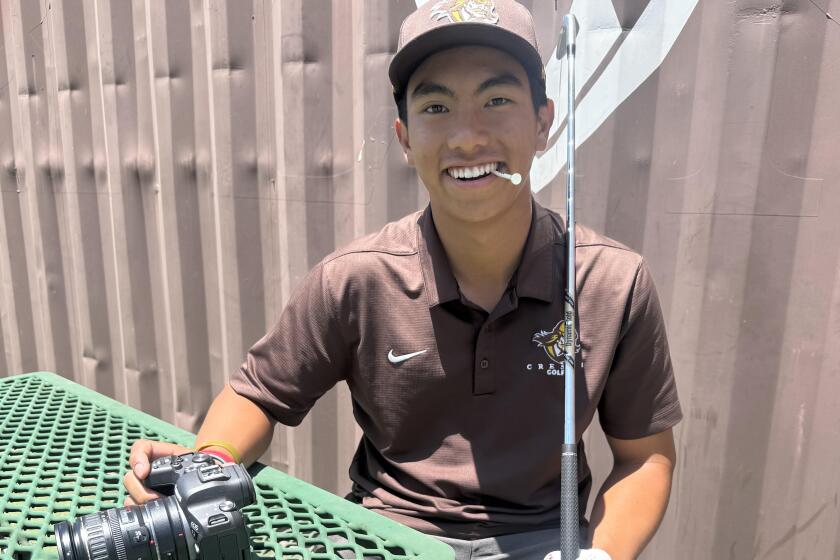He’s Irrepressible, if Not Irreplaceable
- Share via
BOSTON — He would bend Derek Jeter away from the plate with his 117th pitch, a 94-mph fastball, and strike him out with his 122nd and last.
He would react to the appearance of Manager Terry Francona’s calling for a relief pitcher by checking the bullpen in disbelief that someone would even be warming up, putting his hands on his hips, spinning in disgust and mouthing an obscenity.
Curt Schilling brings an edge to the Boston Red Sox in more ways than one.
Francona knew about it because he was Schilling’s manager for a time with the Philadelphia Phillies.
The New York Yankees knew about it because Schilling shared the most-valuable-player award with Randy Johnson when the Arizona Diamondbacks beat them in the 2001 World Series.
For a capacity crowd of 35,023 at Fenway Park on Saturday, Schilling delivered a demonstration.
The 37-year-old right-hander stepped into the storied rivalry for the first time and dismissed the Evil Empire on one run and six hits in 6 1/3 innings while making no apologies for wanting to stay in the game, for thinking 122 pitches were just a warmup.
The Red Sox defeated the Yankees for a second straight game, 5-2, and Schilling, whose trade acquisition in November ignited a winter of “can you top this” warfare between Boylston Street and the Bronx, is 2-0 with a 2.66 earned-run average, and the Red Sox are 3-0 in his starts.
With Pedro Martinez laboring, his velocity down and his control off, Schilling has stepped into the ace void, and that, of course, is what the Red Sox had in mind when they traded four players to the Diamondbacks and gave Schilling a two-year, $25.5-million extension.
“I think the No. 1 reason they brought me in was to be a streak stopper and a streak continuer, and to pitch a lot of innings,” Schilling said. “Whatever else I bring to the table hopefully will be beneficial to whoever else I’m pitching with.”
The beneficial aspects, of course, include that unwillingness to look over his shoulder to see whether help might be on the way.
Schilling worked 256 2/3 innings while going 22-6 with the Diamondbacks in 2001 and 259 1/3 while going 23-7 in 2002.
An appendectomy and broken hand were two of several ailments that restricted him to 24 starts and an 8-9 record last year, but he still pitched 168 innings, struck out 194 batters (he had averaged 304 in the previous two seasons) and produced the National League’s fifth-best ERA at 2.95.
It was no wonder, with his adrenalin pumping, with Jeter having struck out for the first out in the seventh, that Schilling was displeased, as he put it, to see Francona summon a reliever.
“The one thing I can say to his credit is that he’s obviously got a lot smarter when it comes to handling me,” Schilling said of Francona. “He knows better than to try and have a conversation when I’m on the mound and full of emotion. If he hadn’t signaled for the reliever already I probably would have walked out to left field to get away from him.
“I mean, I’m not paid to just pitch 6 1/3 innings. I don’t put in the work I do with the idea of only going that far.
“I always think I’m better than any pitcher they can bring in, and I was as strong in the seventh inning as I was in the second.”
None of this was to suggest that Francona and Schilling have a tenuous relationship. Schilling’s approval of the trade hinged, to a degree, on Boston’s assurance that the former Phillie manager was the leading candidate for the vacant managerial position.
On the Grady Little hot seat, Francona said he wouldn’t expect a competitor of Schilling’s caliber to turn it off just because the manager was on the way to the mound.
“I’ve got no problem with that,” he said. “My main concern was making sure the new pitcher was on the way and getting the ball [from Schilling]. Once I get the ball I don’t care what he says.”
Schilling grudgingly gave it up and was still in the dugout when Keith Foulke, the new closer, recorded the final out in the ninth.
The 5-6 Yankees again looked like a team still suffering jet lag from their season-opening trip to Japan, but why would the Red Sox and their long-suffering faithful care?
The worse the Yankees look, the better.
But, while Schilling had reacted to the trade by saying that he guessed he would have to hate the Yankees now, he dismissed his first official role in the rivalry by saying nothing mattered except the win.
“That’s a good lineup, probably the deepest I’ve ever seen, and to beat the Yankees two in a row is a good thing and the only thing that’s important,” he said.
A win in April, of course, is as good as one in August, but Schilling added that the battle lines should be better defined in late summer, part of the reason he hoped to leave the retrenching Diamondbacks.
“I wanted to be part of something special again, and this team had more of that than any other involved in the process, “ he said. “It’s a privilege to be here and to be playing East Coast baseball again. I just think there’s more intensity, and the fans hold you to a higher standard. I like that.”
East Coast or West Coast, he just doesn’t like to see his manager headed to the mound.
More to Read
Go beyond the scoreboard
Get the latest on L.A.'s teams in the daily Sports Report newsletter.
You may occasionally receive promotional content from the Los Angeles Times.










